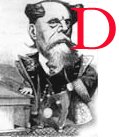
ickens, one of many Victorian authors who comment upon the prevalance of commercial advertising in England, points out that “it has been thought by rash speculatists who spell the Times, that the art and purpose of advertising have attained the highest perfection in this country.” When Dickens adds that “every want that human fancy can invent, or human luxury demand, may be supplied through the agency of one or other of our broad sheet,” he obviously means commercial advertisments, but when he continues it turns out that he also includes personal notes of all kinds as advertisements, too: “when anything that is lost, from a run—away husband to a bolting horse; from a thousand pound-note to a piece of paper “of no use to any but the owner;” from a purse to a pin; is looked for—and seldom without a clue to its recovery—in the columns of the London newspapers, the conjecture that the perfection of publicity has been attained in this country, may be forgiven” (33)
Nonetheless, we must “undeceive the believers in this pre-eminence, by showing that, in at least one department of advertising, we are totally and hopelessly behind the Germans. The sentimental advertisement is nearly unknown to us.” He then proceeds to provide pages of examples like the following:
Pardon, it was not my fault. Thou desirest a letter, but how and where? Here I cannot remain—why, thou must understand. The last was read and burnt. When shall it be'.l Not before Whitsuntide. It is possible thou mightest obtain permission after harvest if thou improvest and Grandpapa contin—but—yet. If I should not write, fear not that I shall always love thee—Thine, JULIA. (33.)
According to Dickens, “where real feeling is concerned, we English keep it as secret as possible.” In contrast, the German is, it would appear, too passionately impatient for this; he makes his declaration at once. not to Fraulin Bertha, but to the whole world. He does not whisper his tale of love into her single ear, but places it in the Cologne or Prussian Gazette, before the eye of Europe” (33). Moreover, “Young Ladies reciprocate.”
Links to Related Material
Bibliography
[Dickens, Charles.] “German Advertisements.” Househouse Words (September (1859:) 33-35,
Last modified 26 March 2022